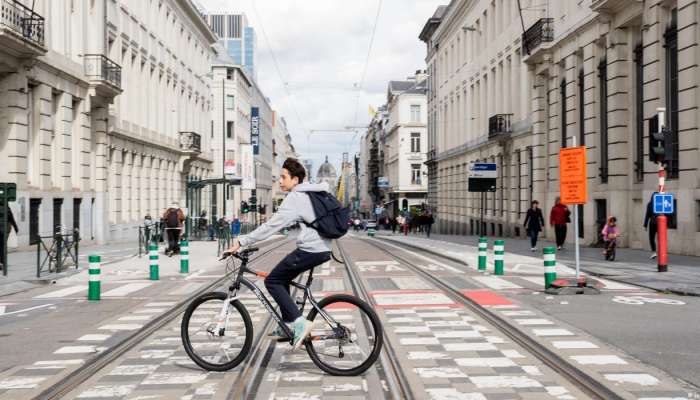
Brussels: As governments across the world have promised to stop polluting carbon emissions by 2050, scores of European cities have pledged to get there by 2030 — just seven years from now.
The European Union wants 100 cities — including capitals Paris, Madrid and Amsterdam — to be carbon neutral by the end of the decade. Berlin, which is not on the list, held a referendum in March on moving its target forward to 2030. Despite a slim majority in favor of the plans, too few people voted overall for the law to pass.
Cities aiming to meet the target by 2030 would have to make unprecedented changes to the way their citizens move, live, eat and sleep. In sectors like transport and buildings, the technologies to do so exist. The pathway is much less clear for industry and agriculture.
Supporters and scientists have highlighted that the shift to net-zero emissions by 2030 would quickly clean up the air, make streets safer and buildings more comfortable.
"All those carbon dioxide emissions cause not just environmental problems, but they also limit our way of life," said Julia Epp, a scientist at the Potsdam Institute for Climate Impact Research in Germany. "We just need a lot more ambition."
Kids and parent volunteers ride their bicycles to school on car-free streets as part of the city's
Why would cities hit net-zero emissions in 2030?
To keep global temperatures from rising by more than 1.5 degrees Celsius (2.7 degrees Fahrenheit) — the target to which world leaders promised to try to limit global warming — humanity must cut pollution fast.
The Intergovernmental Panel on Climate Change found that the world needs to cut carbon emissions to net-zero by the middle of the century. Net-zero means societies have to suck out as much carbon as they pump into the atmosphere. But technologies to remove carbon dioxide are limited and scientists are unsure how much they can absorb.
Still, that finding has led more than 100 countries to set net-zero targets for around 2050. Pressure is also rising on rich countries who have polluted the most, particularly those in Europe and North America, to move faster. While 2050 is a global average, nearly all countries signed the Paris Agreement on Climate Change, which accepts that countries have "common but differentiated responsibilities."
Experts say cities are good targets for faster action because they pump out a disproportionate share of greenhouse gases — partly because they have more people and tend to be richer. Just 10 city regions in Europe are responsible for 7.5% of the continent's total carbon dioxide emissions, a 2022 study found. The 100 dirtiest cities are responsible for 20% of the emissions.
European cities also have the wealth and technology to cut emissions quickly, said Epp. "Doing more — or doing anything — is always necessary and good because it will help us achieve our climate goals."
How easy is net-zero by 2030?
Still, bringing a city's emissions down to zero — or even close to it — is hard. In a sector like transport, officials could force out combustion engine cars, improve public transport and make streets easier to walk. But electrifying the energy supply may require changes that need regional or national support.
"Moving to achieve this by 2030 will demand a quite profound mobilization," said Thomas Osdoba, who leads the EU's NetZero Cities program supporting 112 cities on their way to the target. The program helps members overcome structural, institutional and cultural barriers, with the idea that lessons from one can be applied to another. Because most cities have only just started, it is unclear how likely they are to succeed.
This is a learning process driven by innovation, said Osdoba. "If a good number of cities are able to achieve the goal as specified — and a larger number demonstrate they are able to move much more quickly to the outcome, even if they do not quite make it by 2030 — I would call the mission a success."
In some sectors, like heavy industry, technological solutions are some way off. Facilities to capture carbon and store it safely underground have not yet achieved the efficiency needed to clean up cement plants, for instance. That makes full decarbonization a challenge for more industrial cities.
Port cities like Rotterdam, in the Netherlands, and Hamburg, in Germany will also struggle to clean up without help at a national or European level.
Earlier starts make success more likely
Still, "the crucial issue is not the 2030 goal but the time when action started to achieve the goal," said Felix Creutzig, a professor of Sustainability Economics at the Technical University of Berlin.
Denmark's capital Copenhagen started to tackle its 2025 climate neutrality goal in 2012. The city expects to reduce emissions by about 82% in 2025 compared to 2010, a spokesperson for the city's climate team told DW, mainly from heating and electricity.
Transport emissions were harder to clean up, the spokesperson said, and a plan to capture carbon from a waste incinerator plant will not be completed in time. "Carbon capture is a highly viable — and currently possibly the only — option for waste incinerators to become carbon neutral."
Still, if Copenhagen succeeds in cutting emissions 82% in 15 years, it will be one of the cities that has made the most progress in cleaning up.
"While there are loopholes in Copenhagen's plan, the time frame allows Copenhagen to get close to climate neutrality in 2025," said Creutzig. "In contrast, only starting now with climate action to achieve a 2030 climate neutrality goal is too late."